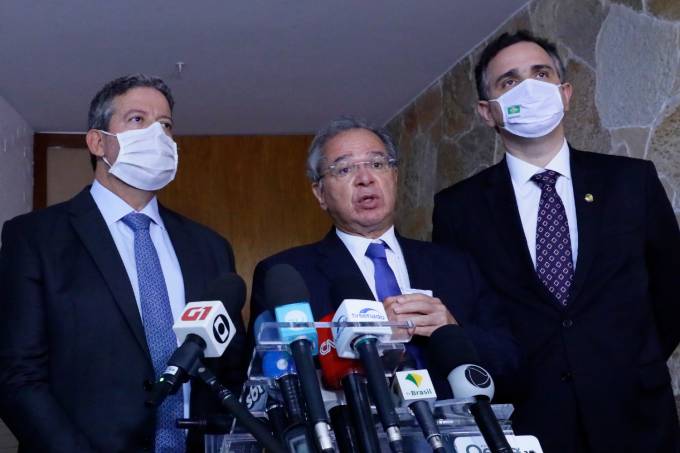RIO DE JANEIRO, BRAZIL – Last Thursday, February 18th, the presidents of the Senate Rodrigo Pacheco, and of the Chamber Arthur Lira, signed a commitment alongside Economy Minister Paulo Guedes to pass a new round of emergency aid with measures to contain public spending.

The plan will be the first major trial by fire of the new alliance sealed between Congress and the Bolsonaro government.
The plan is to put a text to a vote next Thursday, February 25th, that will include a public calamity clause, provided for in the Emergency Constitutional Amendment Proposal (PEC), in the Federative Pact PEC, which provides for the decentralization of federal resources to states and municipalities and the relaxation of minimum spending on education and health.
If passed, the text could unblock new investments in Brazil and generate more jobs, according to Guedes.
“The next few days will be decisive. If we don’t pass the new fiscal framework, interest rates will skyrocket. If interest rates hike, investments will not come and we will not create jobs and income. We will continue to have mass unemployment and economic stagnation. It will snowball. But if a new fiscal framework is established, Brazil will be a different country, with more investments,” says the Minister of the Economy.
Below are the main parts of the interview.
Return of aid with fiscal adjustments
“Amid the pandemic, there were two very clear messages. First, with respect to the importance of a sound policy. The essence of a sound policy is to allocate public resources and make decisions about what to do with the budget. We should conduct sound policy the whole year, as we did in 2020: on the one hand, health and education were allocated resources, and on the other, no salary increases were granted to public servants for two years, in 2020 and 2021.”
“The second message was when we extended the emergency aid until December last year. At the time, we managed to submit the administrative reform to Congress, which will result in savings of around R$300 billion. This turned into a crisis protocol that we want to replicate now. We want to maintain our commitment to health, by passing the war PEC, and to fiscal responsibility, through the Federative Pact.”
New fiscal framework and more investments
“The next few days will be decisive. If we don’t pass the new fiscal framework, interest rates will skyrocket. If interest rates hike, investments will not come and we will not create jobs and income. We will continue to have mass unemployment and economic stagnation. It will snowball.”
“But if a new fiscal framework is established, Brazil will be a different country, with more investments. The challenge is to transform a cyclical recovery, based on consumption, because emergency aid is consumption, into a resumption of sustainable growth, based on investments. Therefore, we need to have a new fiscal framework, otherwise investment will not come. The new fiscal framework is this: attack the health problem without compromising future generations.”
Sound policy and future generations
“Money has to go where the people are. That is a sound policy. During the pandemic, we allocated R$140 billion to states and municipalities, with transfers of resources, debt rollovers, transfers to funds… What did we demand in return? That this money would not become salary increases for public servants in the next two years. Thus, the transitory expenses with health did not become permanent with the public machine and we saved R$140 billion. This is the mindset to protect future generations. The new fiscal framework, therefore, will be a monument to sound policy.”
Vaccination and reforms
“In the first year, we surprised the world when we implemented the social welfare reform. In the second year, people said that the Brazilian GDP would drop by almost 10%, and the first world by 4%. Brazil dropped 4% and England, 9.9%. Most of the main developed countries dropped more than Brazil. So, we surprised the world once again. And now in the third year we will surprise them once more, because we will have mass vaccination and a sound policy. We will be the country that reformed amid the pandemic. President Bolsonaro said that health and the economy had to be taken care of.”
“He created the image of twin crises. In this same vein, the mayor of Curitiba, Rafael Greca, created a beautiful image. He said that Brazil is like a bird that needs both wings to fly, in other words, it needs both health and the economy in good shape. This is the year in which we will have to flap both wings at the same time. That is why mass vaccination and emergency aid on one side and reforms on the other are so important.”
Source: Veja

